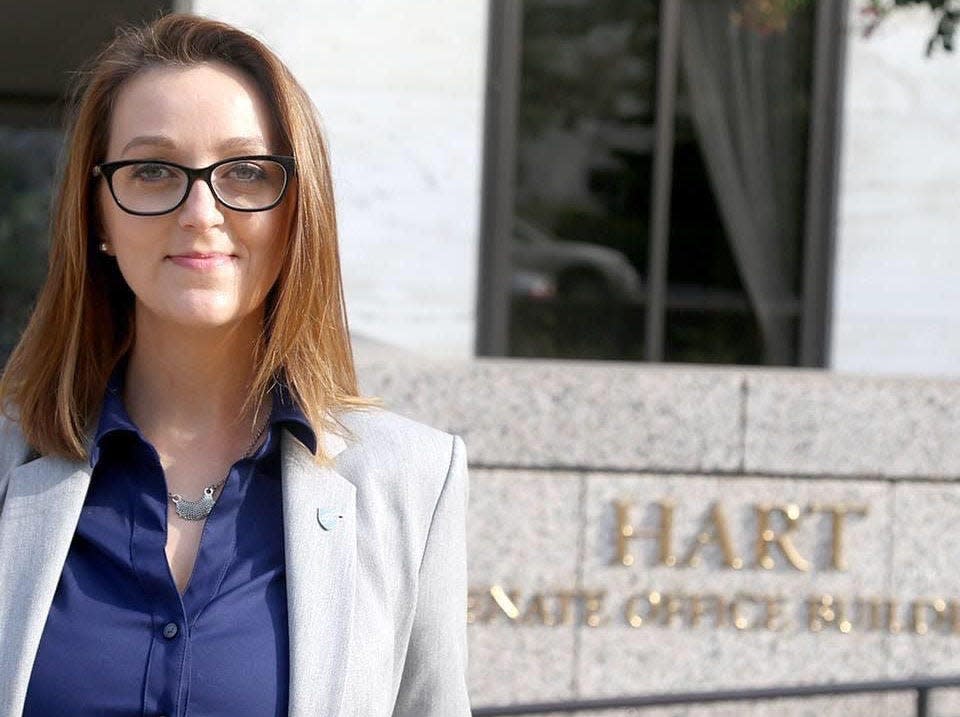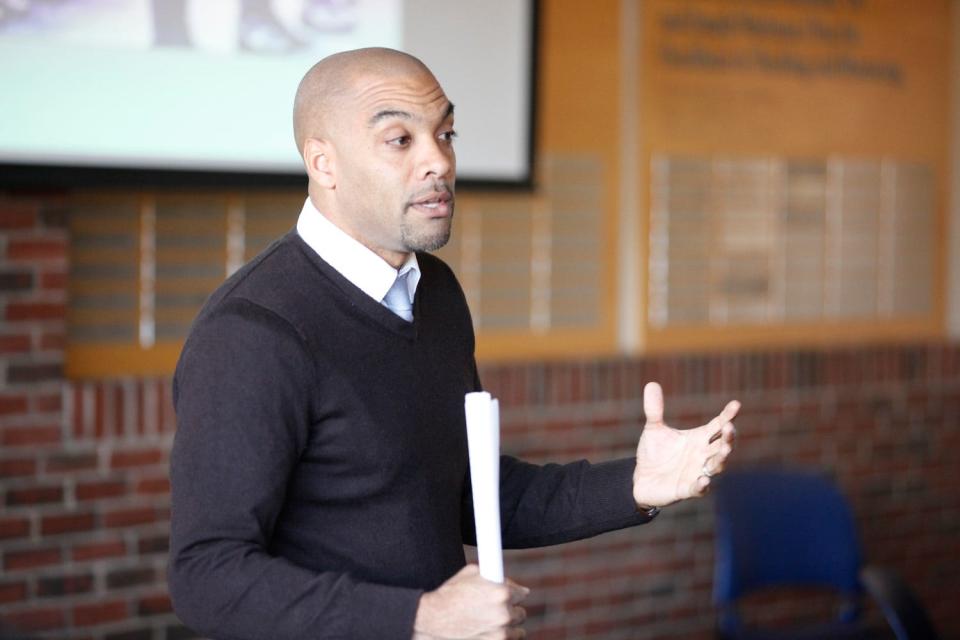‘Laws in search of problems that don’t exist’: Republicans try to ban critical race theory in colleges
Melissa Smith has had a whirlwind couple of weeks.
In late May, the adjunct instructor at Oklahoma City Community College found out that her Race and Ethnicity in the U.S. class had been put on hold because of a new law, SB 1775, that bans critical race theory. Signed into law on May 8 by Gov. Kevin Stitt, the law states that "no teacher shall require or make part of a course that one race or sex is inherently superior to another race or sex.”
On June 4, OCCC reinstated Smith’s summer session of Race and Ethnicity. The difference? Now the class is an elective, instead of a general education requirement in social sciences.

“What screams white privilege more than rewriting a degree program because white privilege makes white people uncomfortable?” Smith said.
Smith’s concern echoes that of many others in higher education. Across the country, as more state legislatures work to pass laws banning critical race theory, free speech advocates and college instructors worry about what those laws could mean for college classes that study race.
Critical race theory is a decades-old academic concept that studies racism as a social construct – as opposed to something tied solely to an individual – and the lingering effects it has within society. Proponents argue that learning the history of racism is crucial to addressing the inequities that result from it, while critics say it singles out white people as the bad guys and, within schools, teaches white guilt.
Since George Floyd’s murder in Minneapolis ignited a racial reckoning across America and Black Lives Matter protesters sparked the second-largest civil rights movement in U.S. history last spring, critical race theory – and whether it should be taught in public schools – has been a hotly debated topic. At least a dozen states, among them Missouri, New Hampshire, Rhode Island and West Virginia, are weighing measures to prohibit schools from teaching about racism or sexism.
Denying Nikole Hannah-Jones tenure will have 'dire repercussions' for UNC, faculty warn
Usually, laws dictating curriculum apply only to K-12. But conservative lawmakers have become bolder in their reach the past few years, sometimes trying to control what colleges teach, too.
When she first heard about the law, Smith, a high school social studies teacher, “blew it off,” she said. “I don’t teach that, so I didn’t think it would apply to me.”
She was surprised to find out it did.
In a statement explaining the pause, OCCC said, “We aim to lower the temperature of extreme positions.”
“If (OCCC’s) interpretation of the bill is correct, it would ban women’s studies, too, or any discussion about race or gender bias,” said Adam Steinbaugh, an attorney with the Foundation for Individual Rights in Education, which works to defend the individual rights of students and faculty. “That pretty much eliminates any discussion about the civil rights movement. How do you talk about something like Selma, Alabama, without talking about civil rights?”
Idaho, Kentucky also take issue with diversity classes
Educators and free speech activists are paying close attention to similar debates unfolding in other states.
In Idaho, state legislators trimmed more than $400,000 from Boise State University's budget in March after conservative lawmakers fumed about what they called "a social justice agenda" pursued by the university. More than 20 lawmakers blamed tuition increases on the school's diversity programs.
“We’ve tried for over a year to have our voices heard by the university, and we have been largely unsuccessful,” State Sen. Carl Crabtree told local media after cutting the budget. “We are left with no other option.”
A few weeks later, Boise State University suspended its diversity seminar after an anonymous complaint was raised. Foundations of Ethics & Diversity, a required course, “helps students investigate how we practice our ethics together as engaged citizens creating an inclusive community,” according to the school’s description of the class. The school offers dozens of variations of the course, including studies in censorship, social problems and the fictional movie and book character Harry Potter, among others.
BSU hired a firm to investigate the complaint, which came from someone the university has never identified. The diversity classes eventually resumed but were moved to an online model, where students watched videos on their own time, a move Steinbaugh at the Foundation for Individual Rights in Education criticized.
“You could view the class but not interact with your classmates or faculty. That’s not a great way to have conversations,” he said.
According to a spokesman from Boise State, the classes are “currently operating as normal in the summer term” and will continue that way.
In the South, Kentucky just missed the initial wave of anti-critical-race-theory legislation because its legislative session ended in March. But last week, Republican lawmakers prefiled two bills for the 2022 session aimed at preventing race theory from being taught in classrooms.
Teaching kids to hate America? Republicans want ‘critical race theory’ out of schools
One applies only to public K-12 schools and prohibits curriculum "promoting" concepts such as "one race or sex is inherently superior" or "an individual, by virtue of his or her race or sex, is inherently racist, sexist or oppressive, whether consciously or unconsciously."
The second bill applies to both public K-12 schools and public colleges and universities. That one bars all conversations "formal or informal" on the same concepts.
It isn't clear how the bill that includes colleges is supposed to be interpreted. On its face, it sounds like any type of Black studies, religious studies or gender studies wouldn't be allowed. But the bill says no student "shall be subjected to" courses with those discussions, which could be interpreted to mean that a student can choose to take those courses but cannot be forced to do so. If read this way, colleges probably would need to drop any diversity-related general education courses.
The backlash was swift. Kentucky's education commissioner and the superintendent of Kentucky's largest school district opposed the first bill within hours of its filing. Democratic Gov. Andy Beshear called it concerning, and Senate Minority Leader Mitch McConnell, a Kentucky Republican, said the government shouldn't dictate how students learn about race. Some teachers said the measure would make basic history, English and art classes difficult to teach; others said they planned on ignoring the measure.
Some professors said they worried that the latest efforts to suppress teaching a fuller view of how marginalized people have been treated throughout U.S. history could further contribute to racial inequalities.
Erica Townsend-Bell, director of Oklahoma State University’s Center for Africana Studies, said, “As far as we’re concerned, it’ll change nothing we do.” Her department has not talked about nor been instructed to review its syllabus or any of its classes, including a Race Theory class the department offers sporadically.
“These laws are in search of problems that don’t exist,” said Townsend-Bell, an associate professor of political science. “No one’s work is about pointing and saying, ‘you should feel bad about this’ to a particular student or accusing an individual of racism. … I can’t imagine any educator worth their salt taking that approach.
“Our work is academic. It’s about analyzing the ways systems and institutions and history inform the way populations are treated unequally.”
SUBSCRIBE: Help support quality journalism like this.
‘We whitewash our history’
For Smith at OCCC, the debate about what to teach in schools is personal. Smith, 38, did her master’s thesis on why some of the uglier parts of U.S. history, including the Tulsa race massacre, in which a white mob attacked and killed hundreds of Black residents in one of the country's worst incidents of racial violence, aren’t taught in K-12. (Oklahoma legislators approved a bill in early 2020 that required the teaching of the Tulsa race massacre in all K-12 schools starting in fall 2020.)
“We whitewash our history,” Smith said. “I heard someone say, ‘We can’t teach white guilt, we don’t want to teach white kids that they’re the oppressor.’ But that’s not what we do – we are educating students about what happened, and we’re not sugarcoating it. The reason we have Black History Month and Women’s History Month is that white male history gets taught the other 10 months of the year.”

Smith has been teaching at OCCC for 12 years, and her husband is a political science professor there. They often remind each other of their teaching philosophy: “It’s not about teaching students what to think, it’s about how to think.”
Because OCCC added the summer session of Race & Ethnicity so late, just two days before the term started, Smith worried it might be canceled again if no one signed up. But late Tuesday, one student signed up – and that’s enough for Smith. The class will be taught asynchronously, which means the student will watch video lectures on her own time (as opposed to attending live lectures). Smith hopes the class could evolve into deep one-on-one discussions between her and the student – because there will be no opportunity for student-to-student discussion – if the student is up for it.
Smith said she received overwhelming support from instructors whom she knows and some she has never met, as well as dozens of former students who reached out. She’s happy that the class is back and that syllabus wasn’t tweaked. But she also said she's “over it," and she's dismayed it's no longer a requirement.
Classes like hers, she said, “are not about ‘What have I done to create these problems in our society?’ It’s about ‘What can I do to solve these problems?’ Without classes like this, we won’t solve any inequity issues. We’ll just continue to perpetuate those problems.
"I say this all the time: If young people of color can face racism, white people can learn about it.”
Contributing: Louisville Courier Journal education reporter Olivia Krauth
This article originally appeared on USA TODAY: Republicans want critical race theory out of college classes, too

